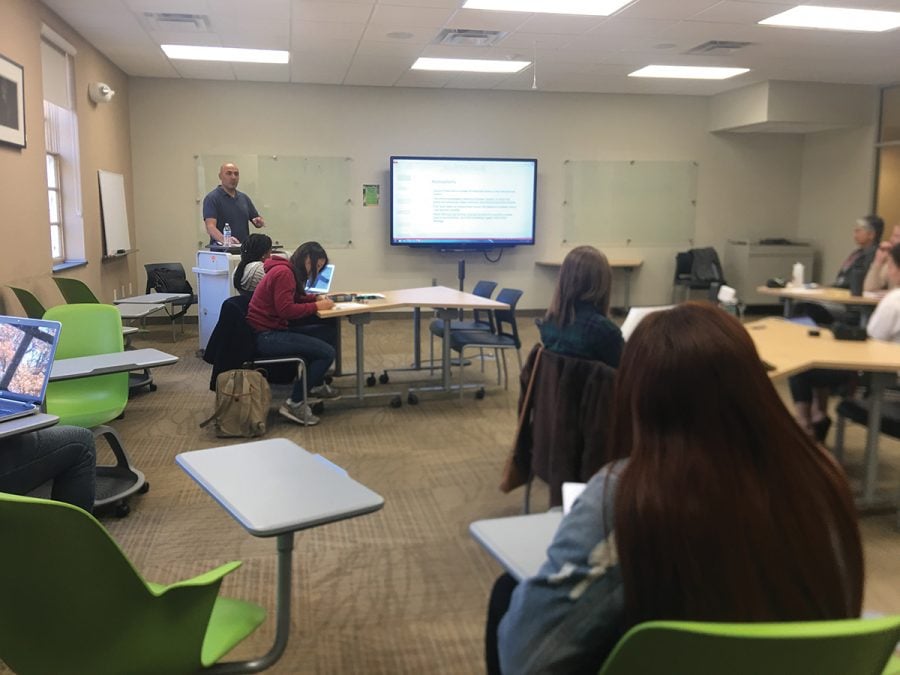Ali Askerov speaks at campus lecture series
The Department of Peace and Conflict Studies and the Conflict Resolution Resources Center hosted a talk called “Global Order: Do We Live in Chaos,” on Tuesday, Nov. 10. // Photo By: Abigail Abantohollans /The Guilfordian
On Tuesday, Nov. 10, the Department of Peace and Conflict Studies and the Conflict Resolution Resource Center hosted a talk by Dr. Ali Askerov as part of the James Fleming Lecture Series. The talk, titled “Global Order: Do We Live in Chaos,” discussed international systems and was held in the Experiential Classroom of Hege Library from 1:00 p.m. to 2:15 p.m.
The talk began with an interactive activity during which attendees were asked to look at any items that they brought with them, and then take note of where that item was made.
“My shoes are from Vietnam,” said first-year Francisco Montenegro.
Guilford community members continued to share with each other a variety of items and locations around the world, from a backpack that was made in Indonesia and a shirt that was made in Nicaragua. The activity was designed to demonstrate functionalism and the interdependencies of the United States with other nations.
“What does that mean, and to what extent are they interdependent?” Askerov said. “Well, as a matter of fact, today we speak about the process of globalism, but 20 years ago it was not like that. 40 years ago, it was not like that. It was all very different, until 1991, when the Soviet Union collapsed. But in the 19th century, it was totally different.”
Askerov went on to explain that this constant change demonstrated a need for understanding international politics.
“There was a completely different system that the world was following,” Askerov said. “And that’s why we should try to understand the different international systems, so that we can then understand how international politics works.”
After demonstrating a need for understanding international politics, Askerov began to define government and state in legal terms.
“So what is the government and what is the state?” Askerov said. “The government is a monopoly that holds power. And while the state should have a government, they are not the same. They are different. A state has a separate government, as well as a territory and permanent population.
“The population can move from one point to another, but usually only within that state. A state should also have recognition. Some legal entities have said that recognition is not required for a state if all other prerequisites are met. So it doesn’t always constitute the power, sometimes recognition just has declarative power.”
Although this system of the government and state is used in national governments to govern its citizens, using it in international relations takes a different form.
“There is a government, and the government makes the law,” Askerov said. “It also interprets the law and enforces the law. And those who have to follow the law are the subsets of the government, or the citizens. Who are the subsets of the international government? The subsets are not individuals but instead they are the states.”
With a lack of a world government, there are distinct changes between national and international political and legal systems.
“But then who is the government,” Askerov said. “Is there a world government or not? Here, the government takes care of its subsets, it takes care of us, when we break the law. We have certain rights in the law. But in the international system, where the subsets are the states, there is no world government to persecute them, so it has to work differently.”
In his talk, Askerov addressed the common misconception that international organizations work as world governments.
“There are international organizations, but those organizations are not a super government,” said Askerov. “They are not world governments. There is a misconception that the United Nations is the world government, but the United Nations is not the world government. In fact, there is not a single world government today. In the domestic arena, in the domestic context, we have a government, but we don’t have that when we enter international relations.”
Due to the many complications of international politics, many schools of thoughts have been formed, taught and studied.
“There are different schools of thought regarding international politics,” Askerov said. “For example, there is realism. Realists believe that international systems function in a particular (fashion). Liberals believe that the international system functions in a totally different way. Functionalists believe differently, Marxists and the school of critical thought believe in something else. Why? Because all of them have good arguments.”
In addition to educating the Guilford community about international politics, the talk also provided students with a chance to learn about future learning opportunities in the Department of Peace and Conflict Studies. Assistant Professor for Peace and Conflict Studies Zulfiya Tursunova announced at the talk that the department will be offering a course in the spring called “Alternatives to Violence.”
“We will have two facilitators, and the training will be held at the end of January or February for three days,” Tursunova said. “It’s a nice opportunity to explore responses and our engagement in conflict, as well as how we can reduce conflict in our communities, personal lives and work places.”
Through the James Fleming Lecture Series and the department’s academic courses, the Peace and Conflict Studies Department is looking forward to creating and continuing dialogue similar to Askerov’s discussion of international relations and the global world.









